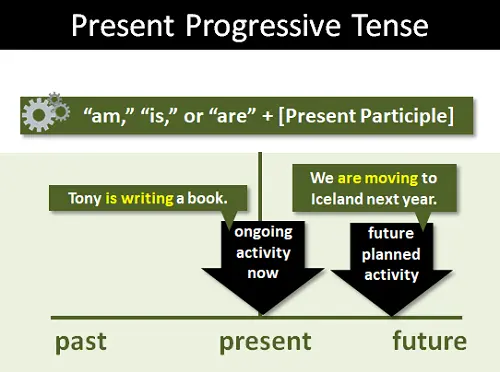Present Progressive Tense


The [verb] + "ing" part is known as a present participle. It is formed like this:
- play > playing
- shout > shouting
- prepare > preparing
- ride > riding
- lie > lying
- untie > untying
- run > running
- forget > forgetting
The Negative Version
If you need the negative version, you can use the following construction:
"am," "is," or "are"
[present participle]
- Caroline is not looking for the latest brochure.
- Dan and Billy are not fishing off the pier.
The Question Version
If you need to ask a question, you can use the following word order for a yes/no question:
"am," "is," or "are"
[present participle]
- Is Caroline looking for the latest brochure?
- Are Dan and Billy fishing off the pier?
[question word]
"am," "is," or "are"
[present participle]
- Why is Caroline looking for the latest brochure?
- When are Dan and Billy fishing off the pier?
"am," "is," or "are"
[present participle]
- Is Caroline looking for the latest brochure or her chair?
"am," "is," or "are"
present participle A
present participle B
- Are Dan and Billy fishing off or jumping off the pier?
Interactive Verb Conjugation Tables
The tables below show all 12 tenses so you can see the present progressive tense among the other tenses. (You can change the verb by clicking one of the green buttons.)
Top 10 Regular Verbs
want look use work start try ask need talk help
Top 10 Irregular Verbs
see say go come know get give become find think
All 4 Past Tenses
- I
- you
- he/she/it
- we
- you
- they
- past tense
- past tense
- past tense
- past tense
- past tense
- past tense
The simple past tense is for a completed activity that happened in the past.
- was present participle
- were present participle
- was present participle
- were present participle
- were present participle
- were present participle
The past progressive tense is for an ongoing activity in the past. Often, it is used to set the scene for another action.
- had past participle
- had past participle
- had past participle
- had past participle
- had past participle
- had past participle
The past perfect tense is for emphasizing that an action was completed before another took place.
- had been present participle
- had been present participle
- had been present participle
- had been present participle
- had been present participle
- had been present participle
The past perfect progressive tense is for showing that an ongoing action in the past has ended.
All 4 Present Tenses
- I
- you
- he/she/it
- we
- you
- they
- base form
- base form
- 3rd pers sing present
- base form
- base form
- base form
The simple present tense is mostly for a fact or a habit.
- am present participle
- are present participle
- is present participle
- are present participle
- are present participle
- are present participle
The present progressive tense is for an ongoing action in the present.
- have past participle
- have past participle
- has past participle
- have past participle
- have past participle
- have past participle
The present perfect tense is for an action that began in the past. (Often, the action continues into the present.)
- have been present participle
- have been present participle
- has been present participle
- have been present participle
- have been present participle
- have been present participle
The present perfect progressive tense is for a continuous activity that began in the past and continues into the present (or finished very recently).
All 4 Future Tenses
- I
- you
- he/she/it
- we
- you
- they
- will base form
- will base form
- will base form
- will base form
- will base form
- will base form
The simple future tense is for an action that will occur in the future.
- will be present participle
- will be present participle
- will be present participle
- will be present participle
- will be present participle
- will be present participle
The future progressive tense is for an ongoing action that will occur in the future.
- will have past participle
- will have past participle
- will have past participle
- will have past participle
- will have past participle
- will have past participle
The future perfect tense is for an action that will have been completed at some point in the future.
- will have been present participle
- will have been present participle
- will have been present participle
- will have been present participle
- will have been present participle
- will have been present participle
The future perfect progressive tense is for an ongoing action that will be completed at some specified time in the future.
Video Lesson
Are you a visual learner? Do you prefer video to text? Here is a list of all our grammar videos.
The present progressive tense is one of four present tenses. They are:
| The 4 Present Tenses | Example |
|---|
| simple present tense | I go |
| present progressive tense | I am going |
| present perfect tense | I have gone |
| present perfect progressive tense | I have been going |
This page was written by Craig Shrives.



